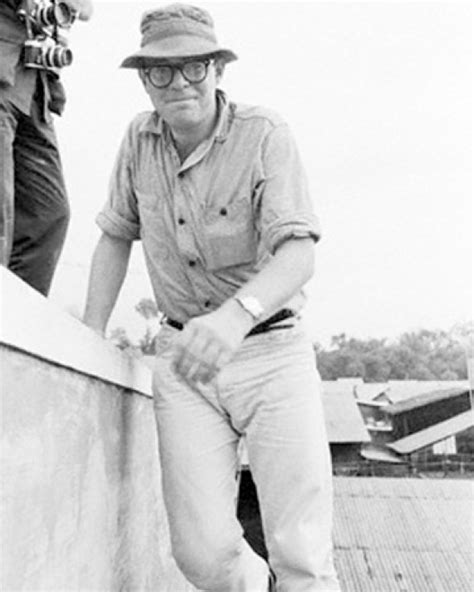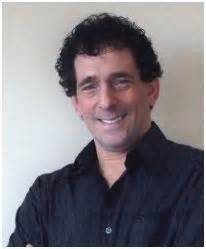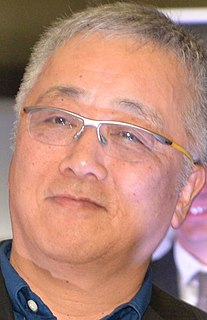Top 985 Techniques Quotes & Sayings - Page 17
Explore popular Techniques quotes.
Last updated on December 4, 2024.
The positive thing about collaborating is that I cannot get distracted by coding work, because I cannot waste the other collaborator's time in the same way as I can my own. And it's always good to learn how the other person works, learn about techniques, learn social things like: how do you communicate with another person? The music I make with other people I'm much more confident about, I'm a little bit less judgemental of the outcome than with my own stuff because I know it's not only me, it's a more outside of me. Sometimes I even like them better than my own tracks.
The good things at the U.S. health care system are that we have a well-trained labor force, particularly physicians; I don't think any nation trains doctors better. We have the latest technology, simply because we throw so much money at it. We are really technology-hungry in this country. That's a good thing. Our system more treats patients like customers, which is a good thing; that it's very customer-friendly. And it's very innovative, both in the products we use, in the techniques we use and the organizational structures we use. Those are all very good things, highly competitive.
Writers imagine that they cull stories from the world. I'm beginning to believe that vanity makes them think so. That it's actually the other way around. Stories cull writers from the world. Stories reveal themselves to us. The public narrative, the private narrative - they colonize us. They commission us. They insist on being told. Fiction and nonfiction are only different techniques of story telling. For reasons that I don't fully understand, fiction dances out of me, and nonfiction is wrenched out by the aching, broken world I wake up to every morning.
People who spend a great deal of time in their gardens attest to the natural mindfulness that gardening requires. What could be more naturally mindful than weeding? It requires a great deal of sustained attention. Weeds need to be taken up with care: Pull too hard, and the weed breaks in your fingers, leaving the root to grow and spread. Different weeds need different techniques and, sometimes, tools. When we weed our gardens, we have to pay attention to where and how we walk and bend. Move too far in one direction or another, and we'll squash growing things.
There are certain records from the 80s and early 90s that you love because the songs are great, but you don't go to them as an example of great production. Over the last 20 years, myself and a lot of other musicians my age have tried to discover things in 50s, 60s, and 70s recording techniques that were lost or discarded. We've all been trying to crack this code. It's been an important period in the last 15 years, reclaiming some of those lost approaches to making records.
No art takes places without inspiration. Every artist also needs effective knowledge of his or her tools (e.g., does a certain brush function well with a particular kind of paint?). What's more, artists need effective techniques for using those tools. Likewise, to express ourselves skillfully with maximum efficiency and minimum effort, we need to investigate the most effective ways of using the mind and body since, in the end, they are the only "tools" we truly possess in life.
We were trying to do as much science as we could because that was the main purpose of the international space station. But without the shuttle to bring up heavy laboratory equipment and bring back samples, we were limited by what we could do, but I was proud that we actually accomplished more science that was planned for the flight. And I got a chance to do two Russian spacewalks on that flight, I had become an expert in U.S. spacewalks and using U.S. suits and techniques, and this was a chance to put on a Russian Orlan suit and do two construction space flights outside of the space station.
We never announced a scorched-earth policy; we never announced any policy at all, apart from finding and destroying the enemy, and we proceeded in the most obvious way. We used what was at hand, dropping the greatest volume of explosives in the history of warfare over all the terrain within the thirty-mile sector which fanned out from Khe Sanh. Employing saturation-bombing techniques, we delivered more than 110,000 tons of bombs to those hills during the eleven-week containment of Khe Sanh.
The automobile, practical since 1906, was proceeding to disintegrate and stamp anew the pattern of communication, manners, and city life in the United States, by 1918; before long, men would begin to see that the automobile, and the mass production techniques which made its possible, could alter the national character and morality more thoroughly than could the most absolute of tyrants. As a mechanical Jacobin, it rivaled the dynamo. The productive process which made these vehicles cheap was still more subversive of the old ways than was the gasoline engine itself.
In 1945 J.A. Ratcliffe ... suggested that I [join his group at Cavendish Laboratory, Cambridge] to start an investigation of the radio emission from the Sun, which had recently been discovered accidentally with radar equipment. ... [B]oth Ratcliffe and Sir Lawrence Bragg, then Cavendish Professor, gave enormous support and encouragement to me. Bragg's own work on X-ray crystallography involved techniques very similar to those we were developing for "aperture synthesis", and he always showed a delighted interest in the way our work progressed.
Caterpillar was quite important because that was the first manufacturing industry that used Reaganite strike-breaking techniques. They illegally called in scabs to break a major strike. It was reported pretty well in the Chicago Tribune, who pointed out something very interesting. They said that the workers got very little support in Peoria when scabs illegally broke the strike, and that was particularly striking because that whole community had been built up by the union - it was a union-based community.
The techniques are all means of dealing with one simple idea: She wrote it. (That is, the "wrong" person--in this case, female--has created the "right" value--i.e., art.)
Denial of Agency: She didn't write it.
Pollution of Agency: She shouldn't have written it.
Double Standard of Content: Yes, but look what she wrote about.
False Categorizing: She is not really she [an artist] and it is not really it [serious, of the right genre, aesthetically sound, important, etc.] so how could "she" have written "it"?
Or simply: Neither "she" nor "it" exists (simple exclusion).
Milton Erickson was a master at using experiential techniques to elicit strengths that were previously dormant. Mills and Crowley have masterfully captured essential elements of Erickson's work and applied it to therapy with children. Easy to read, meticulously referenced, and filled with inspiring case studies, Therapeutic Metaphors for Children and the Child Within has now been updated with important new findings, and it's essential reading for clinicians who work with children as well as for those who want to improve their use of therapeutic metaphor.
During the production of the Steamboy film, what I put my most effort in was the process of layouts, and I did my best to check every detail. Once this process is done precisely, we will get great backgrounds from our art team. This makes the team effort fun. I can't create a movie by myself. It is worthy only because many staff bring new ideas and techniques. I think the appeal of being the director is to encounter such new things, which I don't possess. It is absolutely wonderful to create something new based on teamwork. It is something that I couldn't appreciate in my cartoonist days.
I'm very pessimistic about that, no matter how hard we may try. The Chinese market is huge, but out of last year's $2 billion box office, $1.8 billion was taken in by foreign movies, and just $200 million by our own movies, no matter how much we have learned of their techniques, or their good practices. The Hollywood movies imported into China are all good movies; does the U.S. make lousy movies? Yes, too many lousy movies, but the imports are good films, so how can they not be box office hits? They're all hits.
The definition of insanity is doing the same thing with the same result over and over again, expecting something different. The left just spent how many months trying to destroy Donald Trump, trying to impugn Donald Trump with every weapon they had, with every trick in their book, every tactic that has been successfully used by the media to destroy Republican candidates over the years. It's in their playbook. They brought it all out. Every bit of it blew up in their face; all of it failed. And yet they continue with the same tried and true and worn-out techniques to discredit Trump.
How can there be democracy if the leadership in the United States and Britain don't uphold the values which my father's generation fought the Nazis, millions of people gave their lives against the Soviet Union's regime, didn't they? Because of what? Democracy. And what democracy meant. No torture, no camps, no detention forever or without trial, without charges. In solitary confinement. Those techniques which are not just alleged, they have actually been written about by the FBI. I don't think it's being far left - I hope that I'm wrong to consider that it's far left to uphold the rule of law.
Testing by itself does not improve software quality. Test results are an indicator of quality, but in and of themselves, they don't improve it. Trying to improve software quality by increasing the amount of testing is like trying to lose weight by weighing yourself more often. What you eat before you step onto the scale determines how much you will weigh, and the software development techniques you use determine how many errors testing will find. If you want to lose weight, don't buy a new scale; change your diet. If you want to improve your software, don't test more; develop better.
You've got to be a good reader. So whatever genre that you're interested in, read a lot of books about it and it's better than any kind of writing class you'll ever take. You will absorb techniques and then in a lot of cases you can just start writing using the style of the book or the author that you admire and then your own style will emerge out of that. Be a diligent reader and then try to write seriously, professionally and approach everything in writing in a professional way.
Somebody must have sense enough to meet hate with love. Somebody must have sense enough to meet physical force with soul force. If we will but try this way, we will be able to change these conditions and yet at the same time win the hearts and souls of those who have kept these conditions alive a way as old as the insights of Jesus of Nazareth, as modern as the techniques of Mohandas K. Gandhi. There is another way.
Combinatorics is an honest subject. No adèles, no sigma-algebras. You count balls in a box, and you either have the right number or you haven't. You get the feeling that the result you have discovered is forever, because it's concrete. Other branches of mathematics are not so clear-cut. Functional analysis of infinite-dimensional spaces is never fully convincing; you don't get a feeling of having done an honest day's work. Don't get the wrong idea - combinatorics is not just putting balls into boxes. Counting finite sets can be a highbrow undertaking, with sophisticated techniques.
When I created Chipotle in 1993, I had a very simple idea: Offer a simple menu of great food prepared fresh each day, using many of the same cooking techniques as gourmet restaurants. Then serve the food quickly, in a cool atmosphere. It was food that I wanted, and thought others would like too. We've never strayed from that original idea. The critics raved and customers began lining up at my tiny burrito joint. Since then, we've opened a few more.
Being an actor in TV or movies is different. A film or TV actor, if put in theatre, won't know certain dimensions, while a theatre actor won't know certain things when he comes before the camera. So I think a film actor can learn emoting from this theatre counterpart, while the theatre actor can learn about camera techniques from the film actor.
I'm a strong believer in telling stories through a limited but very tight third person point of view. I have used other techniques during my career, like the first person or the omniscient view point, but I actually hate the omniscient viewpoint. None of us have an omniscient viewpoint; we are alone in the universe. We hear what we can hear... we are very limited. If a plane crashes behind you I would see it but you wouldn't. That's the way we perceive the world and I want to put my readers in the head of my characters.
There's one uneasy borderline between what is external and what is internal, and this borderline is defined exactly by the sense organs and the skin and the introduction of external things within my own body. Consciousness is altered by physical events and physical objects, which impinge upon my sense organs, or which I introduce into my body. Now the name traditionally given to external objects or processes which change you internally is sacrament. Sacraments are the visible and tangible techniques for bringing you close to your own divinity.
























